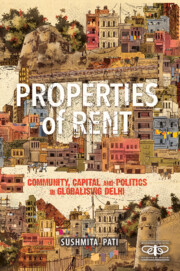Book contents
- Frontmatter
- Contents
- List of Maps and Figures
- Acknowledgements
- List of Permissions
- List of Abbreviations
- Units of Measurement
- Maps
- Introduction
- 1 Creating Values of Land: Law, Records and Kabza
- 2 From Buying Land, Owning Taxis to Becoming Landlords: The Changing Economic Landscape of Villages
- 3 Villages of the City: Ordering Spaces and Aspirations in Neoliberal Times
- 4 In the Shadows of the State: Community as a Mode of Political and Economic Organisation
- 5 Culture, Gender and Belongingness? City and the Violence of Rent
- 6 The Fringes of the Cartel: How the Marginalised Become Landlords
- 7 The Allure of Politics: The Candidates, the Cadre and the Euphoria of Elections
- Epilogue
- Glossary
- Bibliography
- Index
3 - Villages of the City: Ordering Spaces and Aspirations in Neoliberal Times
Published online by Cambridge University Press: 31 March 2022
- Frontmatter
- Contents
- List of Maps and Figures
- Acknowledgements
- List of Permissions
- List of Abbreviations
- Units of Measurement
- Maps
- Introduction
- 1 Creating Values of Land: Law, Records and Kabza
- 2 From Buying Land, Owning Taxis to Becoming Landlords: The Changing Economic Landscape of Villages
- 3 Villages of the City: Ordering Spaces and Aspirations in Neoliberal Times
- 4 In the Shadows of the State: Community as a Mode of Political and Economic Organisation
- 5 Culture, Gender and Belongingness? City and the Violence of Rent
- 6 The Fringes of the Cartel: How the Marginalised Become Landlords
- 7 The Allure of Politics: The Candidates, the Cadre and the Euphoria of Elections
- Epilogue
- Glossary
- Bibliography
- Index
Summary
What is the utility of government and all actions of government in a society where exchange determines the true value of things?
—Michel Foucault, The Birth of BiopoliticsM. C. Mehta vs Union of India and Others was a landmark judgement passed in 2004 concerning industrial units in residential areas. It had its roots in a writ petition filed by M. C. Mehta in 1985, an environmentalist and lawyer, on unauthorised land use by stone crushers. Though it was only about the stone crushers, in the wake of the Bhopal Gas Tragedy, this writ acquired a life of its own and stretched across decades. By 2004, this public interest litigation (PIL) had become representative of all manner of unauthorised industrial activities in residential spaces. The judgement noted that close to 93,000 such units were operating out of Delhi and that the Municipal Corporation of Delhi (MCD) had been granting them registrations and licences although they were in clear contravention of the Delhi Master Plan. This case had a far-reaching impact and led to sealing drives extending even to shops, nursing homes and banquet halls across the city. Protests by angry traders eventually led to revisions in the new Master Plan that allowed for more flexible land use. The M. C. Mehta case, therefore, would continue to hold a very important space in the tussle between the state and private players, and concerns of environmentalism and livelihood. The judgement brought the trading community together against the state, but it also brought the extent of unauthorised construction in Delhi out into the open.
M. C. Mehta vs Union of India came after a series of judgements on the fate of slums and unauthorised settlements. Olga Tellis and Ors vs The Municipal Corporation of Bombay, 1985, reflects the dilemma of the times. At one level, it acknowledged the right to livelihood of the slum dwellers and took note of the structural inequality of city spaces. But on the other, it settled for rehabilitation for the slum dwellers despite noting the structural injustice. By the 2000s, this dilemma had evaporated. Almitra H. Patel and Another vs Union of India compared slum resettlement to rewarding a pickpocket.
- Type
- Chapter
- Information
- Properties of RentCommunity, Capital and Politics in Globalising Delhi, pp. 86 - 115Publisher: Cambridge University PressPrint publication year: 2022



